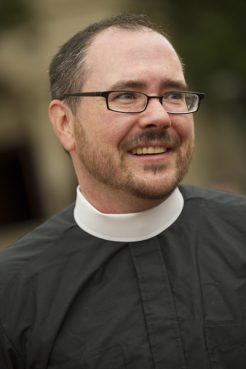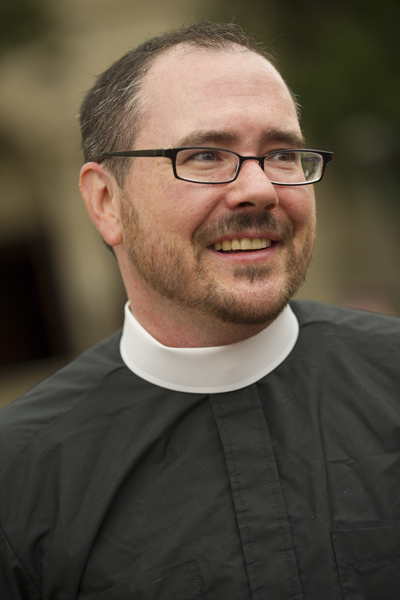
The Rev. Cameron Partridge, religion scholar at Harvard Divinity School and Episcopal chaplain of Boston University. Photo by Kalman Zabarsky/courtesy Boston University Photography
(Editor’s Note: The introduction has been revised after Partridge objected to the use of the pronoun “she.”)
(RNS) The Rev. Cameron Partridge lives outside Boston with his wife and two young children in what looks like, to those who don’t know them, a typical suburban marriage.
While a student at all-female Bryn Mawr College in 1995, Partridge came out as gay and embraced a call to the priesthood. Partridge then graduated from Harvard Divinity School, transitioned from female to male, was ordained an Episcopal priest, got married and completed his doctorate. Today, he’s a religion scholar at Harvard Divinity School and an Episcopal chaplain at Boston University.
We talk to Partridge about his transgender and spiritual journeys, his discomfort with simplistic views of male and female, and feeling at home in Anglicanism. Some answers have been edited for length and clarity.
Q: Can you tell the story of how, transitioning from a woman to a man, you came to choose the name “Cameron” for yourself?
A: In a way, the name chose me. I was at a point in my life when my previous name (which I prefer not to publicly disclose) felt like it no longer fit. I wanted a name that conveyed some sense of gender complexity, since I consider gender in general and my own in particular to be less than straightforward.
At the same time, I had no desire to totally jettison the history — including the thoughtfulness of my parents — caught up in my birth name. Then one day when I was getting sushi takeout, the person behind the register “misheard” my old name as Cameron.
It was a bolt from the blue. I thought, “I think I’ll take that to go too, thanks.” Eventually I looked it up. It turned out to mean something slightly askew: bent nose, crooked stream, or craggy rock. Years earlier I’d bought a button from a queer bookstore that said, simply, “bent.”
And I recalled being struck by a line from Ecclesiastes that I once heard the former Episcopal presiding bishop, Frank Griswold, preach in connection with the scandalous quality of the Christian gospel: “Consider the work of God: Who can make straight what God has made crooked?”
Q: You have said you are often put off by the “before-after” focus of portrayals of transgender people, which can be — your word — “invasive.”
A: For several years now there has been an effort in trans studies to complicate the before-after narrative frame. A great, accessible example is a film by Jules Rosskam called “against a trans narrative.”
I agree with these critiques that “before-after” narratives can have a way of boxing people in. Plenty of trans people don’t medically transition, and those who do transition do so in various ways — they may or may not identify as simply male or female. So “before-after” questions can sometime feel invasive for that reason — because they may unwittingly carry assumptions about how binary or not binary our identities may be.
Q: As a young woman attending Bryn Mawr, you came out as a lesbian, but also, in a way, as a religious person. How so?
A: When I got to college I’d been quietly wrestling with my sense of vocation for a few years. I felt drawn to academic work — ultimately in gender, sexuality and religion — but I also sensed a call to the priesthood.
The priesthood piece just wasn’t very common in either my high school or college contexts, so sharing that with friends felt like a kind of coming out. It was a fairly surprising thing to do. I love that now I know several fantastic Bryn Mawr grads who are also Episcopal priests. We’re like a tiny club.
Q: You’re married to a woman who was your partner when you both were women. And now, as a married straight couple, you’re a pretty conventional-looking family. But you don’t really like the designation “straight couple.”
A: On the one hand, I am read as a member of a heterosexual couple, and there are privileges that I receive because of being read that way. We are legally classified as married both at the state and federal levels, which — as the recent Supreme Court decisions have underscored — is huge.
At the same time, the inconsistency in how the states legally recognize trans people can leave us vulnerable. Ultimately the identity term “heterosexual” doesn’t resonate for me because it fails to capture my history and because I see both gender and sexuality as part of a spectrum, not simply as binary.
Someone else in my exact same position might identify in a quite different way. Here’s the bottom line — perhaps cliche but true: This is about love. I love my spouse and my children. I love being a husband and a dad. It’s truly the adventure of a lifetime.
Q: You found a home at Harvard Divinity School and in the Episcopal Church. What did each of these two institutions provide?
A: To me, HDS is a space of intellectual rigor, and of openness and empowerment to various identities and practices of ministry in multiple traditions. It’s a privilege to now serve in roles that open up that space for students there.
Being Anglican is just in my bones. It was such a fantastic experience to discover in college that the tradition in which I grew up was the one I wanted to embrace as an adult. I love the centrality of the Eucharist, the fairly wide range of communities under our umbrella, our history as both reformed and catholic, our intellectual bent, and our increasing boldness to be about the work of justice.
But most of all I appreciate what’s called “Anglican comprehensiveness,” which often calls us to embody ambiguity. Sometimes that causes us discomfort, even conflict, but it’s at the heart of who we are as Anglicans. I love that.





